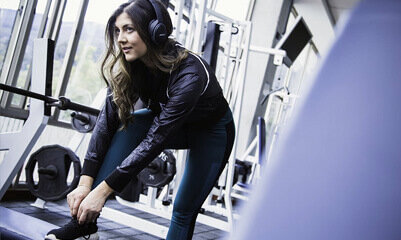Creatine is one of the popular bodybuilding and performance enhancement supplements. Generally, it helps increase muscle mass, boosts strength, and enhances exercise performance.
It’s also among the most-researched muscle-building supplements worldwide, which can help or hurt its repetition. Thanks to the amount of misinformation, many are still confused about its regular use’s advantages, disadvantages, and side effects.
In this article, we’ll debunk the most common myths circulating about creatine.
Retains Excess Water
When mixed with water, creatine’s chemical properties cause a high volume of water around it. This is called the “hydration shell,” which becomes bigger when intramuscular creatine levels increase. The increased volume of water in the muscles can cause an increase in the size of the muscles “temporarily.”
Additionally, creatine tends to cause water retention and bloating before it’s excreted from the body. This can leave creative users feeling puffy and spongy, called “creatine bloating” by many fitness enthusiasts.

Photo by SWOLY Supplements on Unsplash
While it does increase their muscles in size, many, especially bodybuilders, believe the extra water impacts their muscle definition. Aside from the idea that it only temporarily makes them look bulky, they also suggest that it makes them look “soft.” That’s why they usually avoid taking creatine before their competition or don’t hop on the creatine train at all.
However, this creatine bloating is rarely a problem. It’s only short-term and is mainly cosmetic. Additionally, most creatine is stored in your muscles and doesn’t cause water to gather subcutaneously (or under your skin). The “soft” look caused by subcutaneous water is likely from excess sodium caused by intaking low-quality creatine products.

Health benefits of skipping rope exercise. Is it good for you?
Why to jump with skipping rope and what are the health benefits? Rope skipping belongs to fitness activities which help you burn more calories than running.
Water retention can typically be avoided by opting for Outstanding Creatine Supplements that are pH balanced. More importantly, seek professional help to find the best dose and type of creatine for your unique needs.
Causes Fat Gain
The early stages of creatine supplementation indeed cause you to increase your weight. However, it’s because it pulls water into muscle cells, as stated. Particularly, there’s a small weight increase in the first 2-3 weeks of the supplementation when the body attempts to saturate muscle cells with water as quickly as possible.
It’s a myth when people credit this weight gain to an increase in fat mass. Instead, research has shown that long-term creatine supplementation significantly improves reductions in fat mass alongside lean body mass.
Like An Anabolic Steroid
Since creatine can improve workout performance, many thought it had a chemical structure similar to a steroid molecule. However, it’s a compound from amino acids that supplies energy to the cells, especially those in the muscle. It also boosts the body’s production of adenosine triphosphate (ATP), which the body primarily uses for energy. By increasing ATP, creatine improves workout performance.
Causes Kidney Damage
One old case study suggested that creatine could worsen kidney dysfunction in patients with kidney disorders. For otherwise healthy people, no studies have shown that creatine affects kidney function and causes kidney damage to them, and this is backed by research.
For example, one 5-year study examined 75 people who took 16 grams of creatine daily. The results of the study showed that there were no adverse effects on the functions of the kidney and liver in these subjects.

How does Chris Bumstead train?
Chris Bumstead’s workout plan is spread evenly throughout all the five days. He makes sure that all his body parts are attended to in an even manner.
Causes Gastrointestinal Distress
Creatine causes gastrointestinal (GI) distress but is only minor and rare. Statistically speaking, only 5-7% of people who take creatine experience stomach aches. Normally, people get sick when they take creatine on an empty stomach or when they take it too much.
For example, one study reported that athletes who took a lot of doses of creatinine at once experienced GI distress, including stomach aches, diarrhea, and belching. However, no side effects were reported when they took only a 2 to 5-gram dose of creatine.
Causes Dehydration and Muscle Cramps
Two old surveys showed that athletes who took creatine suffered from dehydration and cramping. Perhaps, since then, many users, especially sportspersons, have hesitated to consume the supplement. Since it attracts water and gets stored in the muscles, they thought creatine significantly increases their body’s water demand causing them to get dehydrated and develop cramps.
However, these two pieces of anecdotal evidence were confounded by participants who consume other supplements along with various dosages of creatine. In fact, other studies suggest the other way around.
For example, one study examined 72 collegiate footballers who either consumed creatine or sports drinks and drank placebo. The results showed that those taking creatine had significantly less dehydration, heat illness, muscle tightness, cramping, and total injuries than the placebo group.
Not only in sports but creatine was also found to have positive effects in some medical treatments. For example, one study suggested that creatine can help reduce muscle cramping in hemodialysis patients (i.e., a procedure where the blood is filtered through a machine functioning like artificial kidneys).

TRX Workouts – How To Strengthen The Whole Body in 30 Minutes
Is it possible to work all the muscles in your body in 30 minutes? Try a training plan, which will help you strengthen your whole body. And moreover, you will enjoy it.
Increases Rhabdomyolysis Risk
Rhabdomyolysis is the condition when muscles break down. To diagnose it, one of the tests to run is the blood’s level of creatine kinase (CK), which is released by damaged muscles. While tests show a slight increase in CK levels with creatine supplementation, it’s not to the point of CK elevation that can cause rhabdomyolysis.
Final Thoughts
All available anecdotal evidence, either old or recent, suggests creatine is generally safe to use. While there are many concerns regarding creatine supplementation, they’re not supported by robust clinical studies and scientific literature. Speak to a professional for more in-depth advice.












